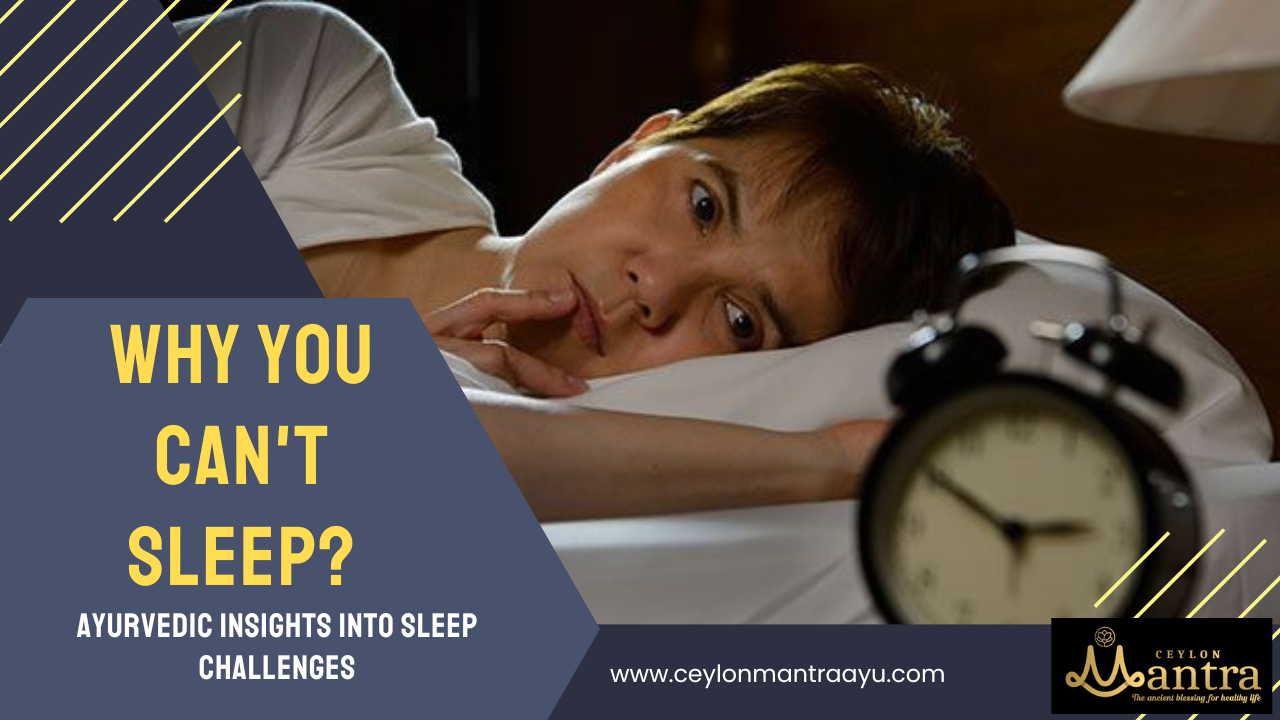Why you can't sleep? - Sleep Deprivation
13/12/2024
Dr. Chandima Madhumalika

Understanding Sleep Disturbances Through the Lens of Ayurveda
Introduction
Sleep is the cornerstone of health and well-being, essential for rejuvenating the mind, body, and spirit. Yet, in today's fast-paced world, sleep disturbances have become alarmingly common, affecting both the quality and quantity of rest. Ayurveda, the ancient science of holistic living, offers profound insights into understanding and addressing sleep disorders by harmonizing the mind-body connection and rebalancing the doshas.
Understanding Sleep Disturbances in Ayurveda
1. Vata-Induced Sleep Disorders
- Characteristics: Difficulty falling asleep, restless or light sleep, frequent waking, and anxiety.
- Cause: Aggravation of Vata dosha, often due to stress, overthinking, irregular routines, or excessive movement.
- Management: Practices that calm Vata, such as Abhyanga (oil massage), warm milk with nutmeg or Ashwagandha, and grounding yoga.
2. Pitta-Induced Sleep Disorders
- Characteristics: Trouble staying asleep, waking up between 2 a.m. and 4 a.m., overheating, and a racing mind.
- Cause: Elevated Pitta dosha due to overwork, frustration, anger, or excessive heat in the body.
- Management: Cooling practices like consuming soothing herbs (e.g., Brahmi, Shatavari), cooling beverages, and meditation.
3. Kapha-Induced Sleep Disorders
- Characteristics: Excessive sleepiness, lethargy, and feeling unrefreshed despite adequate sleep.
- Cause: Imbalance in Kapha dosha due to overeating, lack of physical activity, or a sedentary lifestyle.
- Management: Stimulating practices, light meals, and incorporating invigorating activities like brisk walking or Kapalabhati Pranayama.
Common Types of Sleep Disorders
- Insomnia: Difficulty falling asleep or staying asleep.
- Sleep Apnea: Breathing interruptions during sleep, often leading to poor-quality rest.
- Narcolepsy: Excessive daytime sleepiness and sudden sleep attacks.
- Restless Legs Syndrome (RLS): An uncontrollable urge to move the legs, often disrupting sleep.
- Circadian Rhythm Disorders: Misalignment of the internal clock with the external environment (e.g., jet lag or shift work disorder).
Causes of Sleep Disturbances
- Lifestyle Factors:
- Irregular schedules or shift work.
- Excessive screen time before bed.
- Stress and anxiety.
- Medical Conditions:
- Chronic pain, respiratory issues, or neurological disorders.
- Dietary Choices:
- Heavy meals, caffeine, and alcohol close to bedtime.
- Environmental Factors:
- Excessive light, noise, or an uncomfortable sleeping environment.

Effect of Sleep Deprivation
A lack of adequate sleep—or sleeplessness—can lead to significant physical, mental, and emotional consequences. Below are some common side effects:
1. Cognitive Impairment
- Difficulty concentrating, poor memory, and reduced problem-solving abilities.
- Increased risk of errors in daily activities, work, or driving.
2. Mood Disorders
- Heightened stress, irritability, and emotional instability.
- Increased risk of anxiety and depression due to hormonal imbalances.
3. Weakened Immune System
- Poor sleep reduces the production of infection-fighting antibodies.
- Increased susceptibility to colds, flu, and other illnesses.
4. Hormonal Imbalance
- The disruption of hormones regulates appetite, leading to cravings and overeating.
- Increased levels of cortisol (stress hormone), can lead to weight gain and other health issues.
5. Cardiovascular Issues
- Persistent sleeplessness is linked to high blood pressure and an increased risk of heart disease.
- It can elevate the resting heart rate and cause vascular inflammation.
6. Metabolic Disturbances
- Poor sleep disrupts glucose metabolism, increasing the risk of type 2 diabetes.
- Reduced insulin sensitivity and abnormal lipid profiles.
7. Physical Exhaustion
- Muscle fatigue, poor physical performance, and slow recovery after exertion.
- Increased risk of chronic fatigue syndrome over time.
8. Digestive Issues
- Imbalance in digestive fire (Agni), leads to bloating, acidity, or poor digestion.
- Reduced gut motility, which can worsen gastrointestinal conditions.

Ayurvedic Tips to Address Sleep Disturbances
Ayurveda offers holistic remedies that focus on restoring harmony to the mind, body, and spirit. Here are Ayurvedic recommendations to improve sleep quality. There are 8 tips for better sleep.
Read: https://www.ceylonmantraayu.com/post/67566c8ac0df916d1fd5d2a5
Conclusion
Sleep disturbances are a sign that your body’s natural balance needs attention. Ayurveda offers a holistic approach to understanding and managing these issues, focusing on the root causes rather than just the symptoms. By aligning with the principles of Ayurveda—through balanced routines, mindful dietary choices, and dosha-specific remedies—you can restore harmony to your sleep cycle and enjoy rejuvenating restful nights.
Take small, consistent steps to prioritize your sleep, and let Ayurveda guide you toward better health and well-being. 🌙



